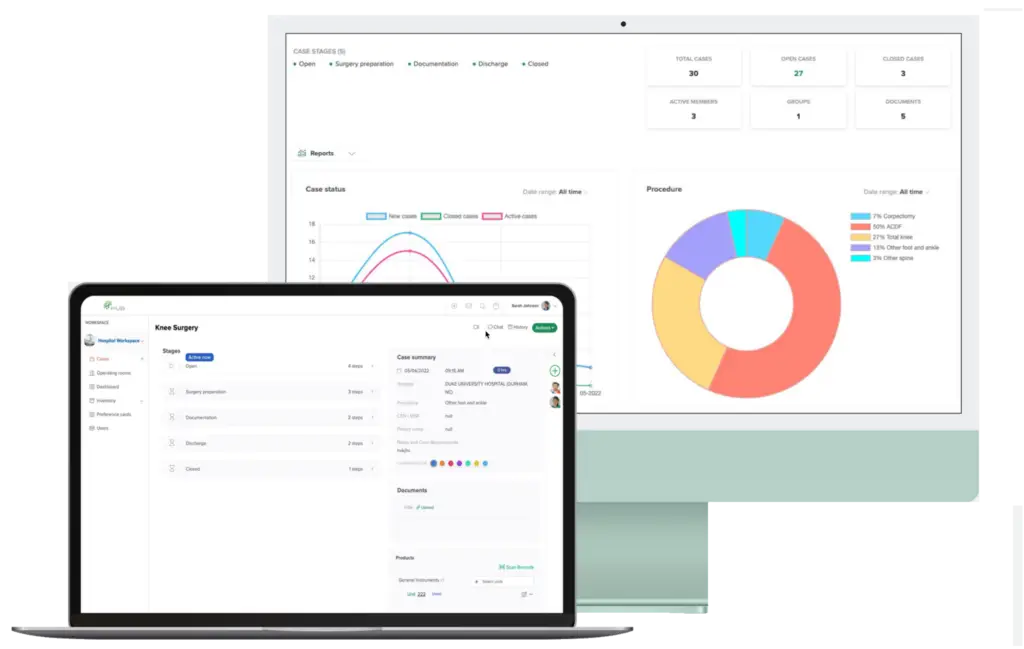Surgery scheduling is a critical component of any healthcare facility, requiring precise coordination of resources such as surgeons, operating rooms, and equipment. Despite the complexity of this task, many facilities still rely on outdated methods like Excel spreadsheets and Google Calendar to manage their surgery schedules. While these tools may appear convenient and cost-effective, they often lead to significant issues. In this article, we will explore the pitfalls of using Excel and Google Calendar for surgery scheduling and discuss why healthcare facilities should consider more advanced solutions.
The Pitfalls of Using Excel for Surgery Scheduling
Lack of Automation
One of the major drawbacks of using Excel for surgery scheduling is the lack of automation. Each task, from entering patient information to scheduling surgeries, must be manually inputted. This process is not only time-consuming but also highly prone to errors, especially when managing a high volume of surgeries. Additionally, any changes or updates to the schedule require manual adjustment, which can lead to confusion and mistakes.
Limited Collaboration
Collaboration is essential in surgery scheduling, as it involves multiple departments and individuals working together. Excel does not support real-time collaboration, meaning that only one person can access and make changes to the schedule at a time. This limitation can cause delays, miscommunication, and even the risk of overbooking or double-booking surgeries.
Lack of Customization
Every healthcare facility has unique surgery scheduling workflows. However, Excel offers limited flexibility in terms of customization. This lack of adaptability can be problematic, as it may not cater to the specific needs and processes of a facility. For instance, a surgery scheduling checklist may be necessary for some facilities, but Excel does not have built-in features to create and manage such checklists effectively.
Difficulty in Tracking Data
Another significant issue with using Excel for surgery scheduling is the difficulty in tracking and analyzing data. Excel does not provide a centralized database, requiring all data to be manually entered and updated. This can lead to inconsistencies and errors, making it challenging to generate comprehensive reports on scheduling performance or identify areas for improvement.
Risk of Human Error
Manual data entry in Excel increases the risk of human error. In surgery scheduling, even a minor mistake can lead to delays, cancellations, or serious medical errors. Given the high stakes involved, minimizing the risk of human error is crucial.
The Pitfalls of Using Google Calendar for Surgery Scheduling
HIPAA Compliance Issues
Google Calendar is not designed to meet the stringent privacy and security requirements of HIPAA (Health Insurance Portability and Accountability Act). Using Google Calendar for scheduling surgeries can expose sensitive patient information to potential breaches, leading to severe legal and financial consequences for healthcare facilities.
Limited Scheduling Features
Google Calendar lacks the specialized features required for efficient surgery scheduling. It does not support advanced scheduling functions such as automated reminders, resource allocation, or integration with other healthcare systems. This can result in inefficiencies and increased administrative burden.
Poor Coordination and Communication
While Google Calendar allows for basic scheduling, it does not facilitate detailed coordination and communication between different departments and healthcare providers. This can lead to misunderstandings, scheduling conflicts, and ultimately, compromised patient care.
Inadequate Data Analytics
Like Excel, Google Calendar does not offer robust data analytics capabilities. Healthcare facilities need detailed insights into scheduling performance, resource utilization, and patient outcomes to optimize their operations. Google Calendar’s limited reporting features make it difficult to track and analyze this critical data.
Risk of Overbooking and Double-Booking
Without advanced scheduling capabilities, Google Calendar makes it easier to inadvertently overbook or double-book surgeries. This can lead to significant operational disruptions and negatively impact patient care and satisfaction.
Conclusion
While Excel and Google Calendar may seem like convenient and cost-effective solutions for surgery scheduling, they come with significant drawbacks. The lack of automation, limited collaboration, customization challenges, data tracking difficulties, and the risk of human error in Excel, combined with HIPAA compliance issues, limited scheduling features, poor coordination, inadequate data analytics, and the risk of overbooking in Google Calendar, highlight the need for more advanced solutions.
Healthcare facilities should consider adopting specialized surgery scheduling software that offers automation, real-time collaboration, robust data analytics, and compliance with healthcare regulations. By doing so, they can improve efficiency, reduce errors, and provide better patient care.
How HUB Healthcare Can Help
HUB Healthcare offers a comprehensive solution designed to enhance communication in healthcare, streamline care coordination, and improve overall workflow efficiency. Our platform includes features such as medical case management software, healthcare document management, and healthcare analytics to ensure that all aspects of patient care are optimized. By leveraging HUB Healthcare’s robust tools, organizations can reduce workflow bottlenecks, automate repetitive tasks, and facilitate better collaboration among healthcare providers. This not only improves work quality but also enhances patient outcomes, making HUB Healthcare an essential partner in achieving healthcare excellence.






